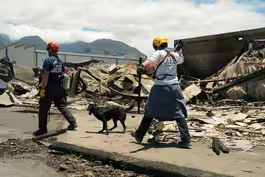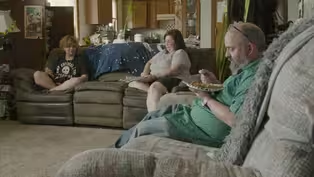
How the ongoing writers' strike impacts reality TV
Clip: 8/19/2023 | 5m 50sVideo has Closed Captions
How the ongoing writers' strike impacts reality and unscripted TV
Writers and actors are still on strike as broadcast TV networks head into the fall season, meaning there will be no new episodes of scripted dramas and comedies. Networks are now filling their prime time schedules with 38 hours of reality and competition shows. Ali Rogin looks at what the writers' strike means for reality and unscripted TV with The Hollywood Reporter’s Ryan Gajewski.
Problems playing video? | Closed Captioning Feedback
Problems playing video? | Closed Captioning Feedback
Major corporate funding for the PBS News Hour is provided by BDO, BNSF, Consumer Cellular, American Cruise Lines, and Raymond James. Funding for the PBS NewsHour Weekend is provided by...

How the ongoing writers' strike impacts reality TV
Clip: 8/19/2023 | 5m 50sVideo has Closed Captions
Writers and actors are still on strike as broadcast TV networks head into the fall season, meaning there will be no new episodes of scripted dramas and comedies. Networks are now filling their prime time schedules with 38 hours of reality and competition shows. Ali Rogin looks at what the writers' strike means for reality and unscripted TV with The Hollywood Reporter’s Ryan Gajewski.
Problems playing video? | Closed Captioning Feedback
How to Watch PBS News Hour
PBS News Hour is available to stream on pbs.org and the free PBS App, available on iPhone, Apple TV, Android TV, Android smartphones, Amazon Fire TV, Amazon Fire Tablet, Roku, Samsung Smart TV, and Vizio.
Providing Support for PBS.org
Learn Moreabout PBS online sponsorshipJOHN YANG: The broadcast TV networks are heading into the fall season with writers and actors still out on strike.
That means no new episodes of scripted dramas or comedies.
Instead, the primetime schedules are leaning heavily on reality and competition shows.
So you'd think the people who work on reality shows would be celebrating.
But as Ali Rogin reports, in Hollywood, appearances are not always reality.
ALI ROGIN: To give us more insight on how the writer strike is affecting reality and Unscripted TV is Ryan Gajewski, digital staff editor at The Hollywood Reporter.
Ryan, thank you so much for joining us.
So is the reality TV industry celebrating the current state of Hollywood?
RYAN GAJEWSKI, The Hollywood Reporter: This has been a surprisingly tough moment for reality TV, and I think that for outsiders and initially, I sort of assumed that, you know, this would be kind of a boom moment for unscripted, right.
You know, when you look at the fall schedules coming up for broadcast TV, a number of networks CBS, ABC, Fox are really leaning heavily on unscripted without having any new scripted episodes to air.
And so I think that it seemed to be something one would assume is that there's a lot of work and a lot of more projects getting greenlit, and that doesn't seem to be the case for some reason.
You know, I've talked to a number of producers who said this is the toughest moment they've seen for unscripted TV right now in terms of people aren't working.
There have been long stretches where since maybe December that a lot of people have been in without work.
And the jobs that are available, as with unscripted, tends to be long hours working weekends, no health benefits.
I think it's surprising for many to learn that unscripted has not necessarily been thriving right now.
ALI ROGIN: The last big writer strike happened between 2007 and 2008.
What were the circumstances then?
RYAN GAJEWSKI: Reality TV certainly had success prior to the strike, but certainly once the strike took place in 2007, there were shows that came about to support the lack of scripted options.
So now I think that the WGA East has unionized some unscripted workers.
But for the most part, the majority of shows are not union.
They're not under union contracts in unscripted.
Certain ones are sort of they call the shiny floor shows tend to be union shows like MasterChef and The Voice kind of those bigger competition shows, but most aren't.
You know, when you look at the schedule for this fall, there are 38 hours of unscripted programming across the five broadcast networks, which is an 81 percent uptick from last year how many shows were being included on fall schedules at this time last year.
So definitely reality is being brought in to help save all these networks, and yet the jobs aren't there right now.
ALI ROGIN: Fascinating.
And you mentioned the shiny floor shows.
How is the strike affecting the celebrity guests, the celebrity judges that take part in these competition shows, other types of reality television who are otherwise participating in the strike?
RYAN GAJEWSKI: Sure.
So I think that, you know, reality hosts who are often well known A listers and people who have acting careers and judges and potentially contestants on shows like Dancing with the Stars, they're covered separately.
So it's not part of the deal that's being currently ironed out that have led to the strike, but just the idea of producing content for a strut company.
I think that some, you know, involved in the undiscripted industry thought that it's possible that hosts would and judges would, for optics reasons, perhaps not want to create new episodes of shows.
But -- so far it appears that right now most shows are still moving forward, even with actors involved.
ALI ROGIN: And producers of reality shows are not considered writers.
They're not part of the writer's union.
But certainly they play a large role in shaping the storylines of these shows.
They do a very similar job that writers do.
So why aren't they covered by the union?
RYAN GAJEWSKI: Yeah, I think that, you know, you talk to people in the industry and there is confusion as far as why that wouldn't be considered.
Writing unscripted has been seen sort of as this cheaper, quicker alternative, and I think that's helped it thrive.
I've talked to people who think that kind of some unscripted programming has kind of leaned in on maybe less experienced producers and people behind the scenes who are able to get work and develop Hollywood experience but are willing to work these longer hours, maybe not getting residuals, not having health benefits.
And so once studios have found a way to create this content in a cheaper way, are you going to be able to change that?
And certainly certain shows have managed walkouts.
So Survivor, I talked to an editor who has worked on two shows, Survivor and History Swamp People, who she was part of walkouts for both shows, and they were able to make those shows union.
So certainly that's a possibility, but it becomes tricky.
You sort of need the show to be seen as indispensable to your platform, and certainly not all shows have that luxury.
And then if you haven't worked in a while, it becomes a little bit scary for work security to then be willing to be part of a walkout because people take your job.
So it gets tricky.
ALI ROGIN: Ryan Gajewski with The Hollywood Reporter, thank you so much for joining us.
RYAN GAJEWSKI: Thanks so much.
How officials can improve disaster responses
Video has Closed Captions
Clip: 8/19/2023 | 6m 30s | How communities can improve warning systems and disaster responses (6m 30s)
What a new Montana law means for transgender children
Video has Closed Captions
Clip: 8/19/2023 | 6m 5s | What a new Montana law means for transgender children and their families (6m 5s)
Providing Support for PBS.org
Learn Moreabout PBS online sponsorship
- News and Public Affairs

FRONTLINE is investigative journalism that questions, explains and changes our world.

- News and Public Affairs

Amanpour and Company features conversations with leaders and decision makers.












Support for PBS provided by:
Major corporate funding for the PBS News Hour is provided by BDO, BNSF, Consumer Cellular, American Cruise Lines, and Raymond James. Funding for the PBS NewsHour Weekend is provided by...

